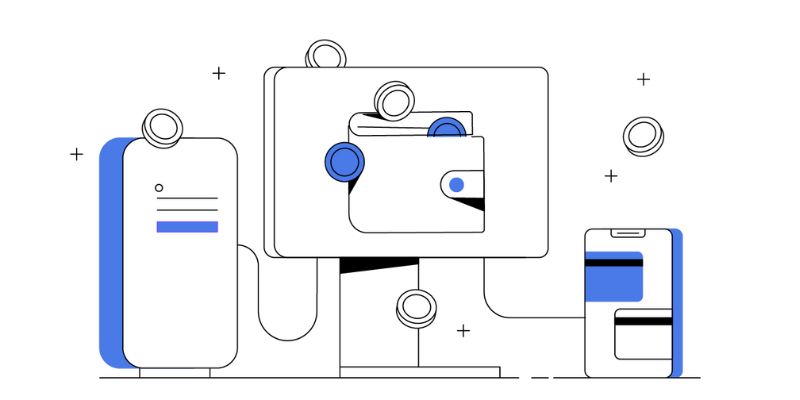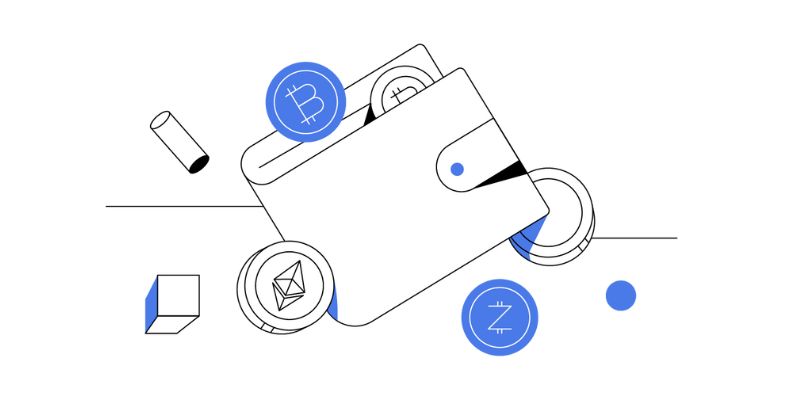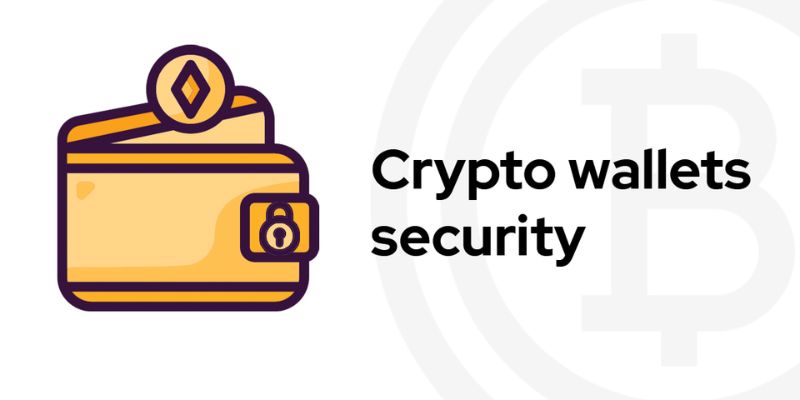Mobile vs desktop crypto wallets: they’re not just a trend; they’re your gatekeepers to the digital currency realm. Your choice can make or break your crypto experience. With hacks lurking and your hard-earned coins at stake, picking the safer path is not a gamble but a necessity. Think of me as your crypto compass, guiding you through the maze of features, risks, and usability. Ready to find out which wallet checks the boxes for security, access, and ease of use? Let’s dive right into the digital deep end and explore what really matters for your virtual vault.
Understanding the Landscape of Cryptocurrency Wallets: Mobile vs Desktop
The Evolution of Cryptocurrency Wallets: A Comparative Overview
Cryptocurrency wallets have changed a lot. Early digital wallets were mostly on desktops. Now, mobile wallets make trading coins easy from anywhere. Mobile wallets for crypto bring security on the go. Desktop crypto wallet advantages include more control and often higher security features.
Yet, not all wallets are the same. Let’s compare them. Mobile wallets are with you all the time. This means quick transactions and always having access. But what about security? Well, mobile wallets put a lot into keeping your coins safe. They use tricky codes called encryption to lock away your data. Only the right key opens it up.
On a desktop, it’s a more settled setup. They’re not as easy to steal, physically. But hackers are smart these days. They find ways to break in through the internet. That’s why desktop wallets pack heavy encryption too. Still, they stay put on your desk, unlike phones that travel with you.
Real talk: wallets are about balance. Want to use your coins for daily items? Maybe a mobile wallet fits your life. For big coin savings, think about desktop wallets or even offline storage options for crypto, like hardware wallets. Each choice has its own rewards and things to look out for.
Identifying Your Wallet Needs: Security, Accessibility, and Features
So, how do you choose the best wallet? Think about what you need first. Security is a big deal. Your wallet should have strong ways to keep your coins safe. Look for wallets that handle private keys with care. Private keys are like secret codes. They prove you own the coins. If someone gets your keys, they get your coins too.
Features are also key. Some wallets hold many kinds of coins. They’re called multi-currency wallets. Others have one job, like a smartphone bitcoin wallet. What matters is what you want to do with your coins. Do you need to switch between coins? Go for a multi-currency wallet.
Let’s talk about getting to your coins. Mobile wallet accessibility is tops. You just open your phone, and boom, you’re in. Doing this on a desktop takes more steps. You have to power it up, maybe enter a password, and then open the wallet program.
And don’t forget about backup. What if your device gets lost or breaks? Wallet backup processes save you a ton of stress. Most wallets give you a seed phrase. It’s a list of words that act like a backup key. With it, you can get your coins back, even if your wallet is gone.
Choosing between mobile and desktop wallets comes down to how you live your crypto life. Do quick buys and pays? A mobile wallet sounds good for you. Got a pile of coins you don’t move much? Desktop might be your game. Or mix both for different needs. Stay smart about how you store your coins. It helps keep them safe and ready when you need them.

Assessing the Security Landscape: Mobile Wallets vs Desktop Wallets
The Critical Role of Encryption and Private Keys Management
Encryption keeps your money safe. It turns data into secret code. Think of it as a superhero guard. Private keys are the superhero’s weapons. They lock and unlock your crypto, like a secret password. In mobile wallets, encryption must be strong, or hackers could steal your keys. Your keys, Your crypto. Never share them. Keep them safe.
Mobile wallets sometimes keep keys on your phone. This could be risky if you lose it. Desktop wallets might keep keys on a hard drive. This is safer from thieves. But if your computer crashes, say goodbye to your crypto if not backed up correctly. Always backup your keys. A paper copy could save the day.
No device is 100% safe. Always keep your software up to date. Mobile wallets need updates from your phone’s app store. Desktop wallets need you to download updates. Outdated software can have holes that hackers use to sneak in. Plug these holes. Update often.
The Realities of Risk: Hacking Vulnerability in Wallet Platforms
Hacking is like a villain in the world of crypto. Mobile wallets face more threats because they’re often with you. Think wi-fi hotspots. They can be traps by hackers. If they get in, they may steal your coins. Desktop wallets aren’t perfect either. Got a virus? Hackers can jump in that way too.
Desktop wallets often need more steps to set up. But don’t let that scare you. It’s like building a stronger fort. More steps can mean better security. Mobile wallets win in being easy to use. Easy access means quick to pay. But it also means quick for hackers.
Let’s chat about hot wallets vs cold wallets. Hot wallets connect to the internet. Desktop and mobile wallets are usually hot. Cold wallets don’t need the internet. They’re like a safe in a bank. Cold is cooler for security.
We’ve compared digital wallet features. Mobile wallets boast easy access. Desktop wallets offer a more controlled setup. Both need strong encryption and safe private keys management. Both face hacking risks. To pick, think about what you need more. Need fast and easy? Go mobile. Want a big safe? Try desktop. Remember to keep a tight grip on your keys and always think security first.
User Experience: Navigating the Nuances of Mobile and Desktop Wallets
Transaction Efficiency: Comparing Desktop and Mobile Wallet Speed
When you send crypto, you want it fast, right? Mobile wallets shine here. They let you make quick on-the-go payments. That tap and pay feature? It’s lifesaver. Now picture this. You’re at your desktop. You must start it first! Then open the wallet. It takes time! Too much sometimes. But hey, they have their perks. Big transactions, for instance, feel safer on desktop.
So what’s the deal with desktop vs mobile wallet speed? Mobile wallets often beat desktops in speed. But desktops can still keep up. Desktop wallets can process transactions quickly too, if your computer is fast. Yet, nothing beats the ease of paying with a smartphone’s tap.
Interface and Usability: The Battle Between Mobile and Desktop Wallets
Ease of use is key with any tech stuff. Like with these wallets. You’ve seen some that are a breeze, and others, well, they are headaches. Mobile wallets? They win on being user-friendly. Big buttons, simple menus, and hey, we’re all used to smartphones. They are often designed with you in mind. But not all are perfect. Some could do better with clear instructions.
Desktop wallets get tangled in features sometimes. They have more space, so they pack in options. Great for crypto pros. Not so much for new folks. Choices piled on choices can confuse. Plus, who has time to click through menus? Yet, desktop wallets have a strong point. See, the bigger screen helps. You can view everything at a glance.
Whether choosing desktop or mobile, user experience matters. A good rule of thumb is to think about what you need. Do you trade lots? A desktop might be more your speed. On your feet a lot? Then mobile is your buddy. Each has its charms and edges in usability.
What about safety? Well, it’s more than just a password. Good wallets protect your coins like a dragon guards treasure. They use encryption to keep your stuff locked down. Plus, managing your private keys and seed phrases? Crucial. Lose those and say bye to your crypto! But make sure you back up. If something goes wrong, a backup is your golden ticket back to your digital dollars.
Bottom line, friends. Picking between mobile and desktop wallets depends on you. How you live, how much you know, and what you need from your wallet. Get one that fits like a glove. Then learn it, use it, and keep your coin safe. Staying informed and cautious is your best bet in the crypto game.

Best Practices and Recommendations for Cryptocurrency Wallet Users
Wallet Backup and Recovery Strategies: Preparing for the Worst
Backing up your crypto wallet is critical. Imagine your wallet lost or failing. The result? Lost funds. Picture having a spare key to your treasure chest. That’s what a backup is. Use a hard drive, USB, or paper to save this key, also known as a seed phrase. Keep it safe, like in a locked safe or a bank safety deposit box.
Next, set up recovery options. If your wallet vanishes or gets stolen, these steps are your comeback plan. Remember, each wallet is different, so tailor your plan to your wallet’s instructions. This could mean writing down a set of words. Or, it might mean keeping a file stored off your computer.
Remember to update your backup. If you add currencies or create new addresses, back those up too. It prevents missing parts of your stored wealth. Like updating a phone contact list, it makes sure no one gets left behind.
Making the Right Choice: Recommendations for Secure and User-Friendly Wallets
Picking the right wallet is like choosing the best friend for your money. Start by asking, “What do I need from my wallet?” Is it speed, or is it safety? Maybe it’s both. Consider a wallet that fits your daily life.
Mobile wallets are handy. They’re like carrying cash in your pocket, easy to spend and move. Good for people always on the go. For smartphone bitcoin wallets, look for ones with good reviews and trusted by many.
Desktop wallets are like home safes. They’re usually more secure and have more features. You’re less likely to take them out and risk them in public. They’re better if you collect and hold many types of coins.
Some users choose hardware wallets. They’re physical devices, like fancy USB drives. They keep crypto offline, away from hackers. Think of them as a vault. They’re a solid choice for long-term holding, but less convenient for quick spending.
Here’s one more idea: combine wallet types. Use a mobile app for spending change, and keep your savings in a desktop or hardware wallet. It’s like not carrying all your cash at once. It lowers the risk of losing everything if something goes wrong with one wallet.
Be wary of fees. Some wallets charge more for moving your money. A good wallet will be upfront about their fees. It’s like knowing the price before you buy a snack.
Lastly, make sure your wallet updates. Wallets, like apps, stay safe with new updates. See if they update automatically or if you have to do it manually. Think about how you update your phone or computer software. It keeps your stuff current and secure.
By weighing options and being smart about security, you choose the best wallet. It’s about finding that balance between being safe and being able to use your crypto when you need it. The goal is to protect your digital dough while keeping it handy for that crypto pizza delivery or a ticket to the moon.
In this post, we’ve walked through the key factors of cryptocurrency wallets, touching on their evolution, security needs, and the user experience they offer. We compared mobile and desktop wallets to help you find the one that best fits your needs. When it comes down to it, whether you go mobile or stick with desktop, always focus on strong encryption and managing your private keys well to keep hackers at bay.
Remember, a good wallet not only makes transactions fast but is also easy to use and keeps your crypto safe. So, keep in mind the wallet backup strategies we’ve discussed; they’re your safety net. To wrap up, picking the right wallet comes down to balancing ease of use with tight security. Choose wisely, stay informed, and keep your digital treasure secure!

Q&A :
What are the main differences between mobile and desktop crypto wallets?
Mobile and desktop crypto wallets are digital solutions designed for storing and managing cryptocurrency assets. The core difference between them lies in their platform of operation. Mobile wallets run on smartphones and tablets, offering portability and convenience for on-the-go users. In contrast, desktop wallets are installed on personal computers and laptops, often providing enhanced security and more features due to the more robust hardware.
Is it safe to store cryptocurrency on a mobile wallet compared to a desktop wallet?
The safety of crypto storage largely depends on the security practices of the user and the design of the wallet itself, rather than the platform. Mobile wallets are generally perceived as less secure due to the higher risk of mobile devices being lost, stolen, or infected by malware. However, most reputable mobile wallets employ strong security measures such as two-factor authentication and biometric locks. Desktop wallets, while potentially more secure from theft, are still vulnerable to malware and hacking if the computer they are installed on is compromised. Both types require careful security hygiene and regular backups.
Can mobile crypto wallets be used for all the same functions as desktop wallets?
Most mobile wallets are designed to perform the basic functions such as sending, receiving, and storing a variety of cryptocurrencies. However, desktop wallets may have a wider range of features due to their larger storage and more powerful processing capabilities. These features can include more intensive applications such as full node operation, integrated exchanges, and more extensive coin support. The functionality will vary from one wallet to another, with some specialized wallets offering unique features on both platforms.
How do I choose between a mobile or a desktop crypto wallet?
Choosing between a mobile and desktop crypto wallet depends on your specific needs and lifestyle. If you need to access your crypto assets frequently and on the move, a mobile wallet could be more practical. For users who prioritize security and may not need to access their wallet as frequently, a desktop wallet could be a better choice. Users should consider factors like the wallet’s security features, supported cryptocurrencies, ease of use, and the user’s own security competencies and convenience needs.
Are there any crypto wallets that offer both mobile and desktop versions?
Many cryptocurrency wallets nowadays offer cross-platform compatibility, providing both mobile and desktop versions for their users. This allows for flexibility and synchronization between devices. However, it’s important to understand that cross-platform wallets must still maintain rigorous security across both platforms, and users should consistently practice good security hygiene, such as using strong, unique passwords and keeping software up to date, no matter which platform they are using.


